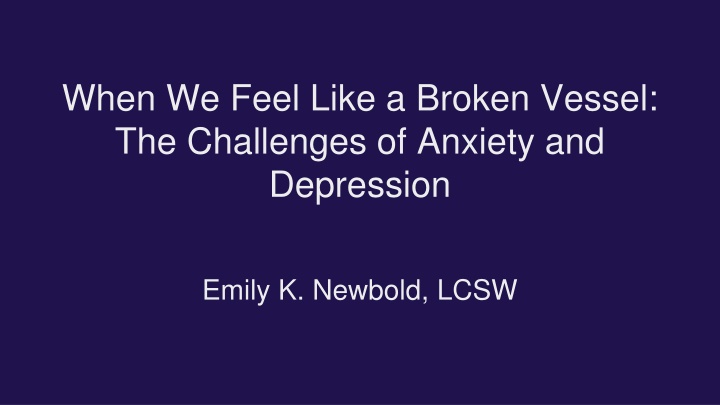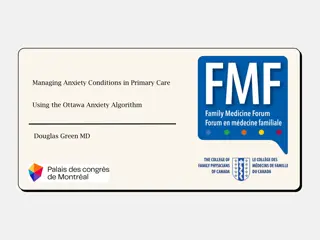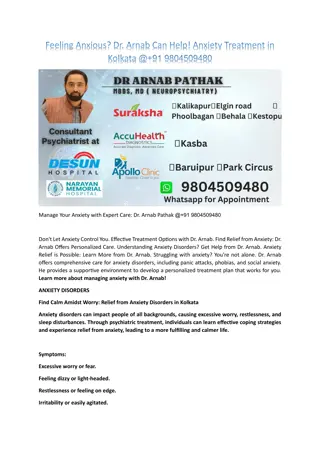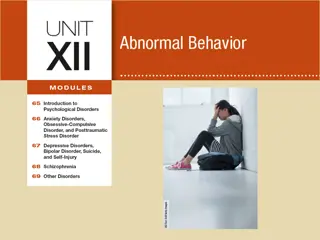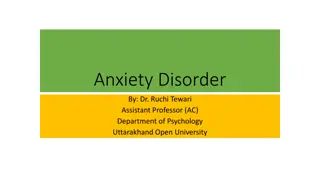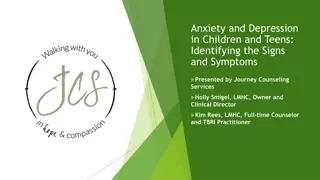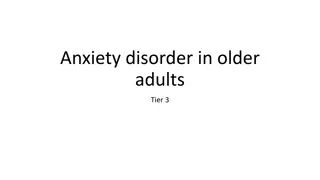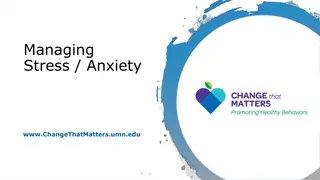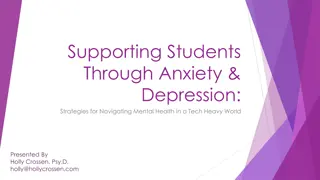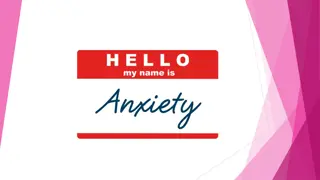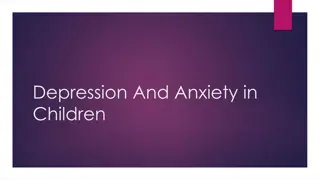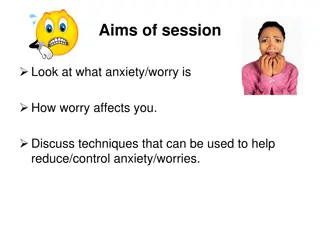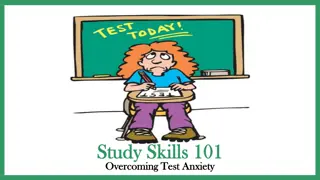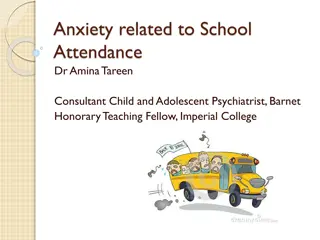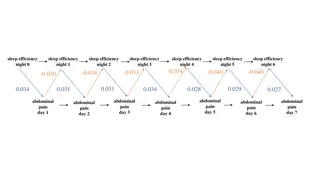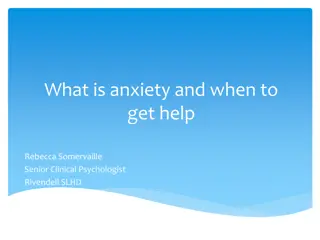When We Feel Like a Broken Vessel: The Challenges of Anxiety and Depression
Depression is a prevalent mental health issue affecting millions worldwide. Learn about its diagnostic criteria, how people describe it, and the challenges it poses. Discover strategies to cope with depression and support loved ones through their struggles.
Download Presentation

Please find below an Image/Link to download the presentation.
The content on the website is provided AS IS for your information and personal use only. It may not be sold, licensed, or shared on other websites without obtaining consent from the author.If you encounter any issues during the download, it is possible that the publisher has removed the file from their server.
You are allowed to download the files provided on this website for personal or commercial use, subject to the condition that they are used lawfully. All files are the property of their respective owners.
The content on the website is provided AS IS for your information and personal use only. It may not be sold, licensed, or shared on other websites without obtaining consent from the author.
E N D
Presentation Transcript
When We Feel Like a Broken Vessel: The Challenges of Anxiety and Depression Emily K. Newbold, LCSW
Our Goals Of This Session: Increase understanding about depression and anxiety: what they look and feel like What we can do if we are living with anxiety and/or depression Identify how we can help others feel safe in opening up to us Overcome social stigma or shame to seek professional help Help those dealing with mental health struggles find comfort in Christ
Depression: The New Normal Depression is a common illness worldwide, with more than 300 million people affected. It is the leading cause of disability in the world 1 in 4 people in the world will be affected by mental illness at some point in their life More than 16 Million Adults had at least one major depressive episode in the past year Affects more women than men
Depression: Diagnostic Criteria Depressed mood or a loss of interest or pleasure in daily activities for more than two weeks. Mood represents a change from the person's baseline. Impaired function: social, occupational, educational. Specific symptoms, at least 5 of these 9, present nearly every day: 1. Depressed mood or irritable most of the day, nearly every day, as indicated by either subjective report (e.g., feels sad or empty) or observation made by others (e.g., appears tearful). 2. Decreased interest or pleasure in most activities, most of each day 3. Significant weight change (5%) or change in appetite 4. Change in sleep: Insomnia or hypersomnia 5. Change in activity: Psychomotor agitation or retardation 6. Fatigue or loss of energy 7. Guilt/worthlessness: Feelings of worthlessness or excessive or inappropriate guilt 8. Concentration: diminished ability to think or concentrate, or more indecisiveness 9. Suicidality: Thoughts of death or suicide, or has suicide plan DSM -IV-TR
How People describe depression I apologize for everything It never lets up I don t want to wake up I m broken Darkness laying on me Foggy I m an alien Angry I can t do anything right Heavy Overwhelmed all the time I want to give up Scared and hopeless My body hurts Everyone is against me! Alone No one will understand I m a failure
What It Looks Like: The journal entry December 21, 2017 I give up. I want to die. I am not a good mom. I yell all the time. I am a horrible wife. I can t feel connected to my husband. I am angry and sad. I am a terrible friend. I am never 100% available to anyone. I can t do this anymore. I do nothing right. I hate me. I m worthless. Everything would be better if I were out of here. Family would be fine. My kids would suffer but it s better than having an unavailable freak mom with them who is terrible and bugs everyone. No one actually likes me. It s all just people playing a role. I am a burden to every person. He could get a new wife. One who likes church and is nice to others. I don t deserve my kids. I just want to die. I just want to stop hating myself and feeling so angry all the time. This anger is so deep and it hurts so much. I can t do anything right.
Some tools to help manage depression Self compassion Identify the minimums Medication Therapy Challenge negative thoughts Separate yourself from your depressed self
Anxiety: Diagnostic Criteria The DSM-5 criteria that are used to diagnose GAD are as follows: 1. The presence of excessive anxiety and worry about a variety of topics, events, or activities. Worry occurs more often than not for at least 6 months and is clearly excessive. Excessive worry means worrying even when there is nothing wrong or in a manner that is disproportionate to the actual risk. This typically involves spending a high percentage of waking hours worrying about something. The worry may be accompanied by reassurance-seeking from others. 2. The worry is experienced as very challenging to control. The worry in both adults and children may shift from one topic to another. 3. The anxiety and worry are associated with at least three of the following physical or cognitive symptoms (In children, only one symptom is necessary for a diagnosis of GAD): Edginess or restlessness Tiring easily; more fatigued than usual Impaired concentration or feeling as though the mind goes blank Irritability (which may or may not be observable to others) Increased muscle aches or soreness Difficulty sleeping (due to trouble falling asleep or staying asleep, restlessness at night, or unsatisfying sleep)
Anxiety: More than just worry 42 million americans live with anxiety disorders About half of those diagnosed with anxiety also live with depression There are six main types of anxiety: GAD, SAD, OCD, PTSD, Panic, Phobias When feeling anxious, brain has a few different responses: fight, flight, freeze, fall asleep, have fun
My thoughts wont stop I m worried all the time What Anxiety Feels Like I feel paralyzed Everyone I love needs to be by me so I know that they are safe. I m avoiding EVERYTHING Why can t I breathe? I feel dizzy My thoughts spiral out of control My head feels full I m going crazy Nowhere is safe WHAT IF . Am I having a heart attack I m a failure It feels like I have a hundred channels going on all the time telling me I m not good enough Nothing makes sense I can t talk to others because I sound stupid My heart is going a million miles a minute
What to do if dealing with anxiety Initiate parasympathetic nervous system: Create your calming or sensory toolbox Tongue up or down Deep breathing Bi-lateral movement Knitting Running Tapping Therapy Medication Cognitive challenging script: Is it true? How true?
How to help those we love Change our language Merciful Non-judgemental Kind Recognize limits Encourage professional help Engage in self care Keep communicating We lighten the loads of others best by helping the Lord strengthen them. That is why the Lord included in our charge to comfort others the command to be His witnesses at all times and in all places. - President Eyring
Overcoming Stigma What can you do? Educate yourself and others about your mental health Find supportive people It s not a secret! If you had appendicitis, God would expect you to seek a priesthood blessing and get the best medical care available. So too with emotional disorders. Our Father in Heaven expects us to use all of the marvelous gifts He has provided in this glorious dispensation. - Elder Holland While talking and a positive attitude did help, I had a medical condition that needed to be treated - Rebecca Clayson
Finding comfort in Christ Ask for and cherish priesthood blessings. Take the sacrament every week, and hold fast to the perfecting promises of the Atonement of Jesus Christ. Believe in miracles. I have seen so many of them come when every other indication would say that hope was lost. Hope is never lost. If those miracles do not come soon or fully or seemingly at all, remember the Savior s own anguished example: if the bitter cup does not pass, drink it and be strong, trusting in happier days ahead. - Elder Jeffrey R. Holland
Always remember My dear sisters, your Heavenly Father loves you each of you. That love never changes. It is not influenced by your appearance, by your possessions, or by the amount of money you have in your bank account. It is not changed by your talents and abilities. It is simply there. It is there for you when you are sad or happy, discouraged or hopeful. God s love is there for you whether or not you feel you deserve love. It is simply always there. - President Monson Hope, on the other hand, is like the beam of sunlight rising up and above the horizon of our present circumstances. It pierces the darkness with a brilliant dawn. It encourages and inspires us to place our trust in the loving care of an eternal Heavenly Father, who has prepared a way for those who seek for eternal truth in a world of relativism, confusion, and of fear. - Elder Uchtdorf
References and Resources NAMI https://www.nami.org/Learn-More/Mental-Health-By-the-Numbers WHO Depression Fact Sheet March 2018 http://www.who.int/mediacentre/factsheets/fs369/en/ Rebecca J Clayson, Depression, Ensign, February 2016, https://www.lds.org/ensign/2016/02/depression?lang=eng Henry B. Eyring, The Comforter, General Confererence, April 2015, https://www.lds.org/general-conference/2015/04/the-comforter?lang=eng Jeffrey R Holland, Like a Broken Vessel, General Conference, October 2013 https://www.lds.org/general-conference/2013/10/like-a-broken-vessel?lang=eng LDS online tools: https://www.lds.org/mentalhealth?lang=eng Dieter F Uchtdorf, The Infinite Power of Hope, General Conference, October 2008, https://www.neurocorecenters.com/8-facts-anxiety-symptoms-statistics Thomas S. Monson, We Never Walk Alone, General Conference, October 2013, https://www.lds.org/general-conference/2013/10/we-never-walk-alone?lang=eng
Thank you! If you have questions or comments, please contact me at: emily@utahtherapyandhealing.com 1-801-899-6797 This powerpoint presentation available at utahtherapyandhealing.com
